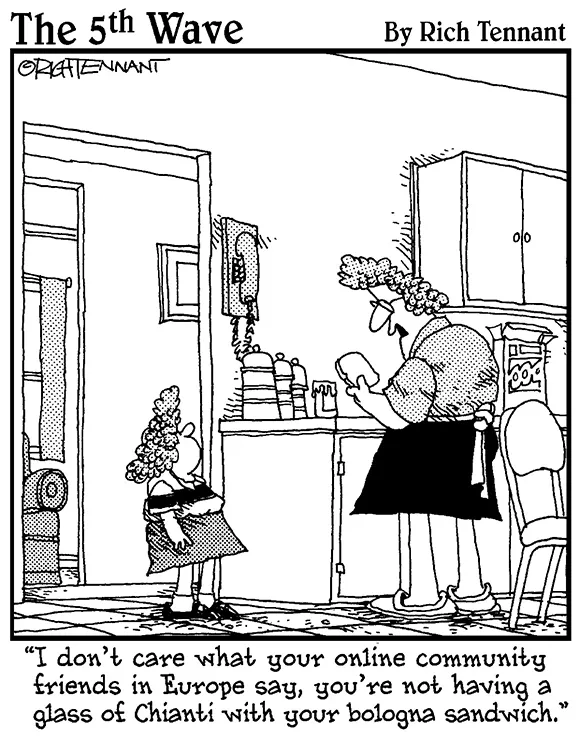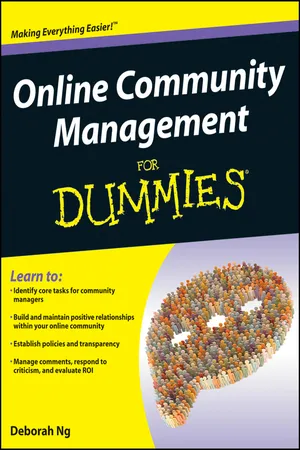Chapter 1
Fostering an Online Community
In This Chapter
Getting the inside scoop on how online communities work
Benefitting from online communities
Digging into the community manager’s job
Tribe, clique, group, network, club, collective, collaborative, and clan are just a few of the words used to describe online communities, or places where groups of like-minded people converge on the Internet. You probably even belong to a few online communities yourself. It doesn’t matter if you’re a gamer, a knitter, or someone who creates video, the people you share and interact with over the Internet are your online community.
Online communities start out slowly, with a few tentative members at a time. Sooner or later, personalities emerge, friendships and alliances form, and cliques and heated discussions follow. If left to their own devices, online communities can become free-for-alls. However, properly managed online communities flourish into a positive experience for all involved.
In this chapter, you discover what it means to be a part of an online community and why a community manager is the backbone of both the community and the brand. You find out why online communities are important, how community members benefit from the brand, and how the brand benefits from the community. Finally, this chapter discusses your role as an online community manager and how online communities absolutely can’t flourish without you.
Understanding What an Online Community Is
A community is a group of people interacting, sharing, and working toward a common goal. This definition works for all communities, whether it’s an offline neighborhood, online collective, or colony of ants.
An online community takes these groups and moves the interaction to the Internet. Whereas neighbors may converse in their yards, in an online community, they interact via social networks, such as Twitter, Facebook, and the newest kid on the block, Google+. They also share in forums, e-mail groups, and even in the comments sections of blog posts and news articles. Members of online communities talk about the same things with their online friends as they do their offline neighbors, but they also rally around a specific topic, product, or cause to share ideas, offer tips, or act as mentors. Online community members are made up of customers, fans, or hobbyists who share a passion for a product, topic, or pastime. Many times, they join communities because people at home in the offline world don’t share similar passions. So they come online to talk at length with the folks who “get it.”
Online communities are no longer primitive forums where hobbyists discuss their crafts. Now marketing teams for household brands are creating Facebook pages and YouTube accounts specifically to sell products. And it’s working.
While members still visit online communities to talk about their passion, thanks to social media and conversational marketing, online communities are now also seen as places to discuss products, receive feedback, and begin word-of-mouth marketing campaigns.
Online communities are best explained by exploring offline “real life” neighborhood communities. Close-knit neighbors not only socialize, but they also help each other. They borrow tools and bring in the mail. They make dinner for sick parents and trade off watching kids. They also maintain common interests — for example, working together to keep common areas attractive and productive.
Just like offline neighborhoods, members of online communities work together to ensure that their haven is safe and tidy and suits the best interests of everyone. Both offline and online communities
Share: Perhaps the members of online communities aren’t going next door for a cup of sugar, but they’re sharing in other ways. They turn each other on to tips, links to resources, advice, commiseration, and secrets to success. They share ideas, swap stories, and answer questions.
Teach: In offline neighborhoods, the woman across the street shares her gardening expertise, and the accountant down the road offers over-the-fence tax advice. Communities have teachers. Many of them don’t set out to teach; to them, it’s all part of the conversation. The same holds true online. In conversation, the members of online communities teach and learn.
Discuss: Tight-knit neighborhoods flourish because individual members stay apprised of the issues that affect their area. They talk among themselves and decide as a united body what changes need to be made. They also discuss common interests. Though united for a common interest, off-topic discussions also take place. Both online and offline communities are places to interact, converse, and cultivate relationships.
Entertain: At home, you probably enjoy community life. You might attend parties and barbecues at each other’s homes, put together block parties, Easter egg hunts, and parades and make sure that there’s more to where you live than houses and stores. Regular participants in online communities also do so because of their entertainment value. Sure, you also learn and make important connections, but if you didn’t enjoy participating in the events and discussions there, you wouldn’t come back.
Assist: Online communities may not experience a barn-raising or rummage sale, but members often receive support in other areas. For example, members who participate at web design forums often collaborate on design ideas and learn new techniques thanks to the generosity of other members of their communities.
Work toward a common goal: Neighbors band together for the common good. Perhaps they form a PTA to help out with school, rally around a sick or injured neighbor, or raise funds for a veteran’s garden. Online groups do these deeds as well. They raise funds for charities, bring awareness to causes, and contribute toward the good of the community.
Beautify: One dingy home brings down the property value of an entire block. A decrepit downtown keeps people from moving or investing into a neighborhood. Ditto a decrepit online community. If a forum or social network is outdated and riddled with spam and vulgarity, members are going to stay away. It’s in everyone’s best interest to make sure that their online hangouts are as beautiful as their offline communities.
Patrol: The safest neighborhoods are patrolled by police and Watch organizations who keep an eye out for unsavory types. Community management and members stay vigilant to make sure online communities remain positive, productive places to network.
Similarities between online and offline communities abound. Members vote on issues, organize safety patrols, and carry on casual conversation. Like offline communities, online neighborhoods work together harmoniously for a common cause. Online communities cast the same positive vibe and sense of belonging.
Exploring the Types of Online Communities
Many different types of online communities exist, but the mechanics and i...

















